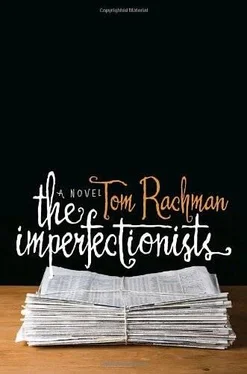She is quiet.
"You can leave me," he says.
"I," she says, "I can't bear that I humiliated you." She can scarcely get the words out, but repeats them. "I can't bear that. I wish you would do something. I wish you were evil like me."
"What are you talking about?"
"I could do anything to you, then? You'd put up with anything?"
"I don't have a choice."
"Do I make any difference here?" Her voice wavers; she is losing control. "I mean, please-get angry with me. Give me the impression I'm involved here, that I'm not just some random girl whose job it is to make sure you don't get lonely at your new life overseas." She struggles out the words. "I don't want you to-if it's possible-to think of what I did as a humiliation to you. It was my selfishness. My acting dumb, like an idiot, for my own selfish, I don't know what, boredom. It wasn't important. I wish I could, you know, make you know that."
She calms somewhat. But there is a distance in her.
"Why did you come down here?" he asks. "You never come down here."
"I had something for you." She holds out an envelope.
He removes the letter and reads the opening lines. "Oh," he says with surprise. "You applied for a patent. In my name." He looks up. "And they rejected it." He laughs.
"It says why, though. You could make some changes maybe."
He reads the letter in full. She must not have realized that his infantile science projects are not nearly sophisticated enough to obtain a patent. He won't look up from the letter. If he does and she is gone, he will not make it out of this room. Of course, that is untrue-he will make it out, climb upstairs, return to work tomorrow, and the following day's paper will come out. That feels even worse.
He must keep her here. He must make his point. But what is his point? What is the point he's been trying to make all along? His impulse is to apologize, but that's wrong, too. Another apology would surely spell the end. She wants him to do something.
"Okay," he says.
"Okay what?"
"Thanks, but who said I wanted a patent?"
"Didn't you? I thought you did."
"And how did you get this stuff, anyway? I mean, did you go through my material down here? That project wasn't even finished."
"What's the problem?"
"Well, it's an intrusion is the problem. I mean, this is none of your business."
"Oh, come on. You're overreacting."
"I don't interfere with your shit."
She goes silent-he never swears. "Personally," she says, "I'd be happy if you entered my stuff in some competition."
"Oh, yeah? Really? You'd like it if I came waving a rejection letter in your face and said, 'Here, I thought I'd do you a favor'? Spare me your next favor."
"Why are you so angry about this?"
"I'm not. I just don't know what else to do," he says. "My stuff down here is mine alone. For no other reason than this dumb workshop is a pleasure for me. I spend my life at a job I hate, in a career I can't stand. I'm forty-one and my girlfriend gets screwed by some guy in her yoga class, by some little Italian kid, and has me pay the legal bills. So-" He waves the rejection letter at her.
She wipes her eyes, but her face is hard.
"So," he goes on, "you can keep your fingers out of my private business. Out of the only stuff I do that isn't a fucking disgrace."
"I'm going upstairs."
"Good." He's losing his nerve. "Good," he repeats louder. "Not upstairs, though. You can fuck off back to the States. I'll pay your ticket."
He joins her in the apartment. She's at the kitchen table, shell-shocked. He takes her suitcase from the cupboard.
"Are you kidding me?" she says.
"You need to pack."
She opens a drawer full of underwear and socks, stares at them, doing nothing for a minute.
As she fills the suitcase, he goes online and buys a ticket for her flight back to Washington, leaving the next day.
"That's three thousand bucks," she exclaims, looking at the computer screen. "Are you insane?"
"Too late. I just paid for it." He phones a hotel and books her a room for that night.
"What about my things?"
"Get them shipped. Look, don't take the flight if you don't want. But then you're paying your own way home."
He calls a taxi and carries her bags outside. He drops them beside her at the curb and goes back in, without a word. His legs tremble on the stairs up. In the apartment, he stands over the toilet, spitting bitter saliva into the bowl until his mouth is dry.
How long before she arrives at the hotel?
If he calls too soon, he'll seem insane. He must appear to have cooled down.
He sits on the cold tiles of the bathroom, his shoulder against the toilet bowl. He rereads the letter from the patent office. It was kind of her. Nothing she has done has touched him like this. And the rejection is useful: it puts an end to all these years of ridiculous daydreams. No inventor, he. That's done with, then. Good.
He waits two nauseating hours.
Has he made his point? The point he's been trying to make? But no, this isn't the point he wanted to make at all.
He picks up his cellphone and finds that she has sent him a text message: "i miss u, can i come for visit?" It was sent hours before, when he was still in the basement and she was still here. He calls her mobile, but there is no answer.
He phones the hotel. The reception desk transfers him to her room. His mouth is parched. He keeps swallowing.
"It's me," he says as the phone is answered. "My point is this. I think we both want." He hesitates. "Don't we? Or am I-"
But he is interrupted. It is a man's voice. It is Paolo.
1977. CORSO VITTORIO, ROME
The paper improved under Milton Berber. It developed pluck and humor, pulled off the occasional scoop, even won a couple of awards-nothing stunning, but still unprecedented in its history.
The newsroom changed, too. In the old days, journalists were referred to as "the boys." Now many of the boys were women. Crude jokes earned fewer snorts of approval, and ethnic slurs did not fly. Milton demanded that ashtrays (and the floor is not an ashtray) be used. The filthy carpeting was changed, made pristine white again. And the cocktail bar in the east wall was replaced with a watercooler; the consequent decline in typos was extraordinary.
Typewriters disappeared next, replaced by video display terminals. Overnight, the newsroom's distinctive clack-clack-bing went silent. The rumbling basement presses hushed, too, with the work outsourced to modernized printing sites around the globe. No longer did vast rolls of newsprint slam into the backside of the building in the late afternoon, jolting any dozing reporter awake. No longer did delivery trucks clog Corso Vittorio at dawn as workmen loaded the papers, copies still warm.
News got cooler, quieter, cleaner.
However, the biggest change was money: the paper started making it. Not a heap, and not every month. But after decades it was profitable.
While other publications snubbed far-flung outposts, the paper targeted them, finding its niche at the fringes of the world, copies turning up on armchairs in the Diamond Dealers Club of Freetown, or at a village newsagent on the island of Gozo, or on a bar stool in Arrowtown, New Zealand. A passerby picked it up, perused a few pages and, as often as not, the paper gained a new devotee. By the early 1980s, daily circulation had neared twenty-five thousand, climbing annually.
With readers around the globe, it was impossible to produce a normal daily-yesterday in Melbourne wasn't yesterday in Guadalajara. So the paper took its own route, trusting reporters and editors to veer from the media pack, with varying success. The trick was to hire well: hungry reporters like Lloyd Burko in Paris; nitpicky wordsmiths like Herman Cohen.
The paper also gained a reputation in journalistic circles as a feeder to prestigious U.S. publications, which attracted young hotshots to Rome. Milton trained them, wrung copy from them for a few years, then hoisted them to high-profile positions elsewhere. Those who moved away recalled him with affection and always dropped by the office when transiting through Italy, showing off their expensive jobs, boasting of bylines and babies.
Читать дальше












